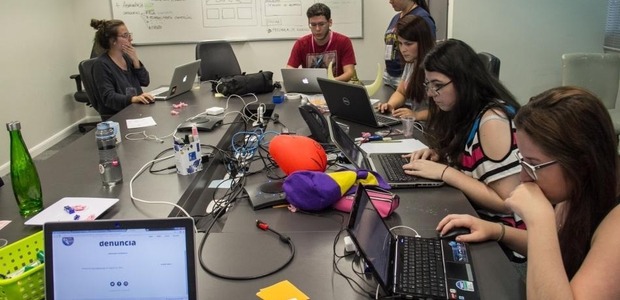advertisement
Anti-harassment app for women wins IGNITE International Girls hackathon
A team of four young women coders from Porta Allegra in Brazil has won the IGNITE International Girls Hackathon with…

A team of four young women coders from Porta Allegra in Brazil has won the IGNITE International Girls Hackathon with an anti-harassment app called Não Me Calo, which means “I will not shut up”.
The team competed against coders from India, Taiwan and the United States to create the best app addressing the challenge of creating safe spaces for women. They will now work with partners from the Global Fund for Women, which organised the hackathon, to fully develop the app.
The IGNITE International Girls Hackathon started in February 2015 where more than 70 girls in five international cities participated in the Hackathon, a project of Global Fund for Women. During the Hackathon, girl coders worked in teams to create a new website or application that could increase girls’ access to safe spaces in their communities (both online and physical).
advertisement
Catherine King, the executive producer of the Global Fund for Women, says that the hackathon is meant to address the gender gap in access to information technology, and to encourage women to create and shape technologies.
Não Me Calo (I Will Not Shut Up) is an app and social networking tool that lets women review and rank public venues based on the level of safety they provide for women and girls. Não Me Calo also encourages women to fight for change by using these rankings to pressure business owners and governments to improve security in locations that have received unfavorable reviews.
The Não Me Calo app uses Google Maps to allow users to navigate their city and choose where they spend money based on the review and reports of others in the Não Me Calo network. Users are encouraged to identify venues or locations where they have experienced verbal or physical abuse and harassment. The app then ranks the locations by number of reported incidents, thus identifying the spaces that are most dangerous for women. Once a particular location has been identified as unsafe, pressure can be applied to the business owner or government representative to improve security in the venue or area.
advertisement
Right now the app primarily contains information about Porto Alegre, Brazil, where the creators live. As more and more people create reviews, it will grow to include information about venues and areas all over the world.
Women’s safety apps or features are becoming increasingly popular, particularly in India where they are seen as a way to respond to public violence against women. Earlier this year, Uber, the taxi-hailing app, added a new ‘SOS button’ to their Indian version after a driver raped a passenger in December 2014.